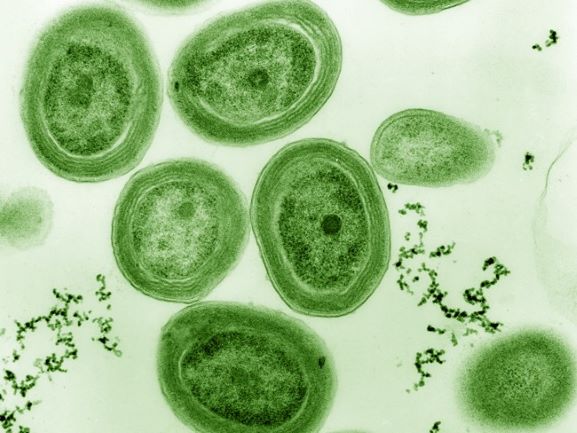

Prochlorococcus under a microscope
A new study by Macquarie University found the marine bacteria that are responsible for as much as ten percent of all the oxygen on our planet are vulnerable to plastic pollution.
“We found that exposure to chemicals leaching from plastic pollution interfered with the growth, photosynthesis and oxygen production of Prochlorococcus, the ocean’s most abundant photosynthetic bacteria,” said study lead author Dr. Sasha Tetu. “Now we’d like to explore if plastic pollution is having the same impact on these microbes in the ocean.”
Estimates say that Plastic pollution causes $13 billion worth of economic damage to marine ecosystems each year. By 2050, plastic pollution is expected to outweigh fish in the ocean.
“This pollution can leach a variety of chemical additives into marine environments, but unlike the threats posed by animals ingesting or getting entangled in plastic debris the threat these leachates pose to marine life has received relatively little attention,” said study co-author Dr. Lisa Moore.
In an unprecedented analysis, the researchers investigated how these chemicals affect photosynthetic marine bacteria, the smallest life forms in our oceans.
[related_post]
“We looked at a group of tiny, green bacteria called Prochlorococcus which is the most abundant photosynthetic organism on Earth, with a global population of around three octillion (~1027) individuals,” said Dr. Tetu.
“These tiny microorganisms are critical to the marine food web, contribute to carbon cycling and are thought to be responsible for up to 10 percent of the total global oxygen production,” said Dr. Moore. “So one in every ten breaths of oxygen you breathe in is thanks to these little guys, yet almost nothing is known about how marine bacteria, such as Prochlorococcus respond to human pollutants.”
The team exposed two strains of Prochlorococcus to chemicals leached from plastic grocery bags and PVC matting. The study revealed that exposure to these chemicals impaired the growth and function of the microbes. The chemicals also impacted the amount of oxygen the bacteria had produced and altered the expression of a large number of their genes.
“Our data shows that plastic pollution may have widespread ecosystem impacts beyond the known effects on macro-organisms, such as seabirds and turtles,” said Dr. Tetu. “If we truly want to understand the full impact of plastic pollution in the marine environment and find ways to mitigate it, we need to consider its impact on key microbial groups, including photosynthetic microbes.”
Mumbai headquartered bioenergy engineering & tech major Organic Recycling Systems Ltd (ORSL) has launched a…
India is undergoing a significant influx of urban migration and a reclassification of rural areas,…
India’s quest toward green hydrogen economy received a significant boost with a strategic MoU between…
A new report by S&P Global has revealed that India’s growing biofuels industry is emerging…
In a significant breakthrough for India’s renewable energy and dairy sectors, dairy major Amul has…
Renewable energy conglomerate Anaergia Inc, through its subsidiary, Anaergia S.r.l., entered into a contract with…